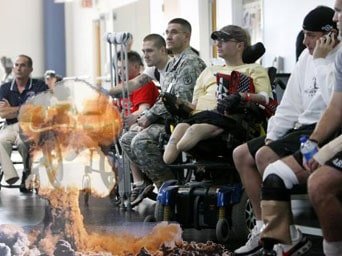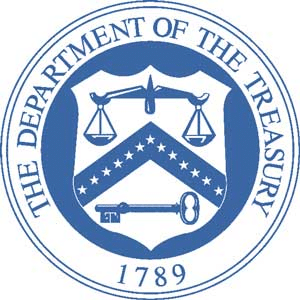by Jere Beery
New garnishment policy enacted by the US Department of Treasury. Below is the explanation of the new policy enacted by the US Department of the Treasury. This legislation misses the mark on current federal garnishment protection under USC Title 42 §659.(h)(1)(B)(iii) for disabled veterans in receipt of disability compensation.
This language also contradicts the current language and protection under USC Title 38 §5301, which stipulate that any money traceable to VA disability is not considered property, nor subject to attachment, seizure, garnishment, levy under any legal process whatsoever. When civil courts garnish veterans’ disability under the premise of this new policy, it can be construed as double jeopardy, since federal laws already protect all benefit moneys against any garnishment order. The Department of Treasury would no legislative authority under the current federal statutes to garnish any veterans’ disability compensation, nor can it extend this fraudulent authority to the banks. To do so would constitute a violation of the federal laws that prohibit such legal process.
The U.S. Department of the Treasury recently enacted a new regulation that requires banks to protect federal benefits from being garnished. Before these protections were in place, exempting federal benefit payments from being garnished was hit or miss depending on your showing up in court or proving that the funds in your account were exempt. Here is what you need to know:
The new policy became effective May 1, 2011, and requires banks to review accounts when they receive a garnishment order. If the account contains federal benefits from any of the following sources, then the bank must protect those funds:
- Social Security,
- Supplemental Security Income,
- Veterans Affairs, Railroad Retirement,
- Railroad Unemployment Insurance
- Civil Service Retirement System and Benefits from the Office of Personnel Management or
Federal Employees Retirement System.
Well, at least a portion of them. In order for the federal benefits to qualify for protection, they must be directly deposited into the bank account. Federal benefit deposits made by check do not qualify for protection.
The protected amount would be based only on the federal benefit deposits identified in the previous two months immediately preceding the garnishment order. The bank is required to review the accounts of the person named in the garnishment order within two days after receipt of an order. For example, if during the look-back period the bank identifies two federal benefit deposits of $1,000 each, they are required to protect $2,000 of funds in the account.
The bank is required to review all accounts for the person named in the garnishment order, but is only required to protect funds in the account(s) where the federal benefits are direct deposited. So, if you move money from your checking account (where your VA benefit is direct deposited) into your saving account, the funds in your saving account are not protected from garnishment.
Any funds in the account in excess of the protected amount established during the two-month period preceding the garnishment order are not protected and are eligible for garnishment per the order received by the bank.
If the garnishment is to pay delinquent child support or a federal debt, then the above rules do not apply and all the funds are subject to the court order or IRS levy.
So, if your bank receives a garnishment order for you and your Veterans Affairs benefits are directly deposited, they should be protected. But, any money in the account in excess of two months of VA deposits or any money in other accounts at that bank would be fair game for the credit card company.
This new policy punishes veterans by seizing their disability compensation by attempting to redefine the garnishment protection under USC Title 42 §659 and USC Title 38 §5301. There are no special conditions on such garnishment for it protects any and all disability compensation disbursed by the Department of veterans Affairs. This language under this new law attempts to undermine the original intention of Congress under USC Title 38 §5301. It would not make sense for the federal government to implement laws that contradict other federal laws in such protection, consequently subjecting them to ambiguity in its interpretation.
It is hard to imagine that the other Veterans Service Organizations failed to understand the implications of this new law in its entirety, since, it does presents questions on whether current laws will supersede the existing federal statutes under USC Title 42 §659 and USC Title 38 §5301.
If you are a disabled veteran receiving service-connected disability compensation, you would be well advised to take your money out of the bank and bury it in a can in your backyard.
Contributing to this article;
Simon Alvarado, MSW
Legislative/Research analyst
Operation Firing For Effect

Although Jere Beery only served 4 years in the U.S. Navy, he has an impressive military history. Twenty-seven months of that service was in the combat waters of Vietnam. His first duty station in 1965 was aboard the USS WESTCHESTER COUNTY, (LST-1167) as a Seaman. The WESTCHESTER COUNTY was involved in many operations within the combat waters of South Vietnam and received many awards and accolades for her service. The WESTCHESTER COUNTY was the recipient of 15 Battle Stars for her 19 years of service. LST-1167 was one of only 3 ships of her type to earn 15 Battle Stars (out of over 1200 LSTs built since before WWII).
Beery’s second duty station in 1967 was with the legendary PBRs of the Brown Water Navy. As a volunteer, Beery saw combat on a fairly routine basis with this elite group and their high-speed patrol craft. On March 1, 1968, Beery’s patrol was ambushed by a sizeable force of NVA and Viet Cong. The boat Beery was aboard took two direct RPG hits to her starboard side badly wounding four members of the boat’s crew. Seaman Beery was the most severely wounded and not expected to live. The first RPG had exploded right where Beery was standing as he manned his 50 caliber machine gun. To this day, Beery contributes his survival to the life-saving actions of his patrol officer, LT. RICHARD GODBEHERE and his other crew members. Beery spent the next year and a half hospitalized and recovering from his wounds. THE GODBEHERE PATROL
On November 1, 1968, while Jere Beery was recuperating at NAS Hospital, Jacksonville, Florida, USS WESTCHESTER COUNTY was attacked on the My Tho river. At 03:22 in the morning two very large mines were detonated on the ship’s starboard side. 25 men were killed, 17 were the ship’s crew. Several of the men killed that morning were friends and former shipmates of Beery’s. This incident has gone down in history as the greatest loss of life by the U.S. Navy in a single attack during the entire Vietnam War. USS WESTCHESTER COUNTY
In mid-1969, Jere Beery was medically retired from the Navy. His service record reflects 1 Bronze Star, 3 Purple Hearts, and 5 military campaigns in Vietnam. Beery was also rated totally and permanently disabled by the Veterans Administration.
Over the years since Vietnam, Jere Beery has attempted to do some things many thought impossible for someone with physical injuries such as his. During the early 80s, Jere Beery, as a member of the Screen Actors Guild pursued a brief career in the motion picture business as an actor. Beery landed a few small parts in a number of movies and television programs. On several occasions, to the amazement of many, Beery even executed his own stunts.
In 1986, Jere Beery gave up his career in the movies to crusade for his fellow veterans. Since that time, veteran’s rights advocate Jere Beery has been a noted driving force in the Veteran’s Rights Movement and effort to improve services for our veterans. Beery’s efforts have been extremely well documented and many articles have been written about his quest. A few of these articles can be found on this page. You can also type the words “Jere Beery” into any search engine to find out more about Beery’s efforts. www.google.com
Jere Beery’s multifaceted story is truly an amazing one. From his survival in Vietnam to risking additional injury executing stunts in the motion pictures, to fighting to protect the benefits earned by our troops, Jere Beery has forged his own trail and continues to amaze and baffle many.
– Place and Date of Birth: Orlando, Fl – 03/13/48
– Raised: St. Augustine, Fl
– Place & Date Enlistment: Jacksonville, Fl – 05/20/65
– Branch of Service: U.S. Navy
– Highest Rate/Rank: E4/PO3/Signalman Third Class
– Duty Stations: USS WESTCHESTER COUNTY, LST-1167 and TF116, River Patrol Force, River Section – 511, (PBRs), Binh Thuy, RSVN
– Date of Discharge: 5/14/69
– Type of Discharge: Honorable, Medically Retired
– VA Rating: 100% Totally and Permanently Disabled
Military Awards and Medals:
– 1 Bronze Star – w/combat “V” Citation
– 3 Purple Hearts – (1/5/68, 2/14/68, 3/1/68)
– Vietnam Service Medal – w/1 Silver Star – (5 military campaigns in-country, RSVN)
– Republic Of Vietnam Campaign Medal – w/1960 device
– Combat Action Ribbon
– Meritorious Unit Commendation Ribbon
– Presidential Unit Commendation Ribbon
– National Defense Medal
– Republic of Vietnam Meritorious Unit Citation – Gallantry Cross Medal Color, w/Palm
– Republic Of Vietnam Meritorious Unit Citation – Civil Actions Medal, First Class Color, w/Palm
Military Training:
– River Patrol Craft Training, (PBR), Mare Island, CA
– Special Weapons Training, Mare Island, CA
– J.E.S.T. (Jungle Environmental Survivor Training) – Cubi Point, Philippines
– S.E.R.E. (Survival, Evasion, Resistance, Escape Training) – Whidbey Island, Washington State
– Vietnamese Language – Mare Island, CA.
ATTENTION READERS
We See The World From All Sides and Want YOU To Be Fully InformedIn fact, intentional disinformation is a disgraceful scourge in media today. So to assuage any possible errant incorrect information posted herein, we strongly encourage you to seek corroboration from other non-VT sources before forming an educated opinion.
About VT - Policies & Disclosures - Comment Policy





